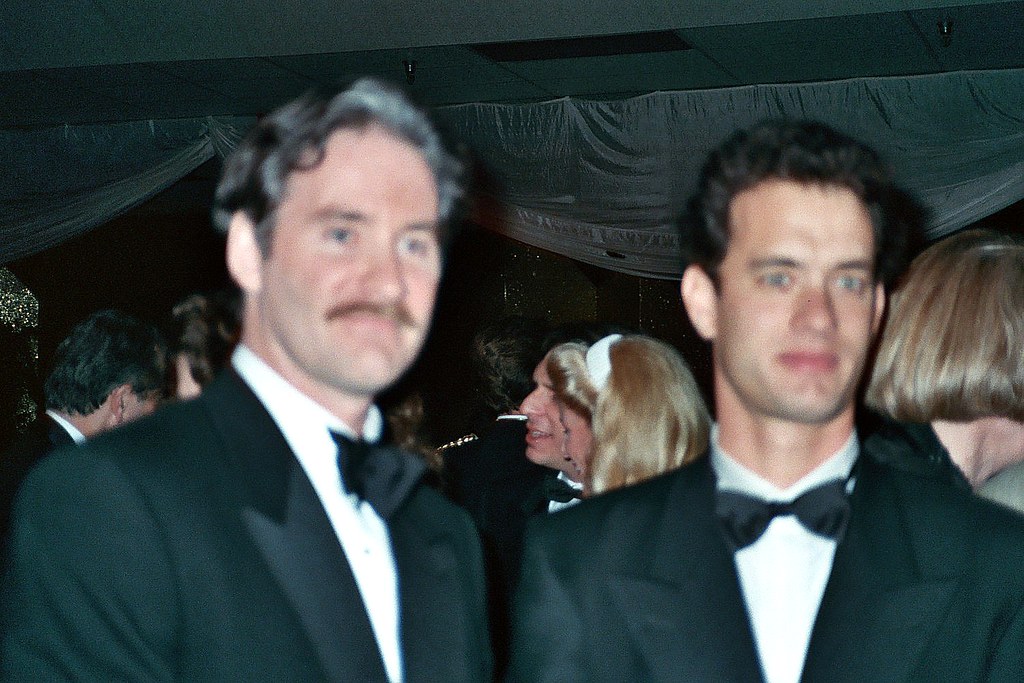Table Of Contents
Tom Hanks, a Hollywood icon known for his diverse roles and timeless performances, recently found himself at the center of an artificial intelligence (AI) controversy. In a world where AI is rapidly transforming industries, Hanks has experienced both the allure and the hazards of this cutting-edge technology. While expressing concerns over unauthorized AI usage of his likeness, he simultaneously embraces AI innovations in his upcoming film Here, directed by Robert Zemeckis. This duality underscores a growing debate in Hollywood about the ethical use of AI and its potential to reshape the entertainment industry.
In this article, we dive into the complexities of Hanks’ relationship with AI, exploring the technological milestones and ethical dilemmas that come with this transformative tool.
Tom Hanks’ AI Controversy: A Cautionary Tale
Earlier this year, Tom Hanks took to Instagram to warn his fans about an AI-generated video promoting a dental plan that featured his likeness without his permission. The video, which used deepfake technology, alarmed Hanks and prompted him to caution his followers:
“BEWARE!! There’s a video out there promoting some dental plan with an AI version of me. I have nothing to do with it.”
This unauthorized usage of Hanks’ image highlights a growing issue within the entertainment industry—AI’s ability to replicate an actor’s likeness without consent. As AI tools become more sophisticated, they pose significant ethical challenges, particularly in terms of intellectual property and performers’ rights.
Tom Hanks is not alone in his concerns. Hollywood actors and writers have raised alarms over the potential for AI to displace jobs in the industry. The issue has led to strikes from creatives who fear that advances in AI technologies could render human actors and writers obsolete. This situation exemplifies the ethical minefield Hollywood must navigate as AI becomes more integrated into film production.
Embracing AI: Hanks’ Role in the Film Here
In stark contrast to his unsettling experience with unauthorized AI use, Hanks is set to embrace the full potential of AI in his upcoming film Here, directed by long-time collaborator Robert Zemeckis. This film explores the evolution of a relationship over decades, and AI plays a pivotal role in bringing the narrative to life.
Zemeckis has teamed up with AI company Metaphysic to utilize their groundbreaking tool, Metaphysic Live. This technology enables real-time de-aging of actors, allowing Hanks and co-star Robin Wright to portray various stages of life seamlessly. The real-time processing capability of Metaphysic Live allows actors to see their younger selves on screen immediately after filming, providing instant feedback to adjust their performances.
As Zemeckis noted, the film’s narrative would not be possible without these AI advancements:
“The film simply wouldn’t work without our actors seamlessly transforming into younger versions of themselves.”
This innovative use of AI showcases how the technology can enhance storytelling in ways previously unimaginable.
How Metaphysic’s AI Tool Works
Metaphysic Live represents a significant leap forward in AI-driven visual effects. Its real-time processing and photorealistic de-aging technology are redefining how films are made. Here’s how it works:
- Real-Time Processing: Metaphysic Live applies high-resolution face-swapping and de-aging effects in real-time, significantly reducing the need for post-production work. This capability allows actors like Hanks to see themselves as younger versions in the moment, streamlining the filmmaking process.
- Generative Adversarial Networks (GANs): The technology relies on advanced GANs, which generate hyperrealistic avatars by analyzing both historical data and synthetically created images. This ensures that subtle facial expressions and micro-expressions are captured with precision.
- Youth Mirror Feature: One of the standout features of Metaphysic Live is the “youth mirror,” which allows actors to see their younger selves reflected in real-time on set. This real-time feedback helps actors fine-tune their performances based on how their de-aged selves appear on screen.
- High Standards for Realism: To avoid the “uncanny valley,” where AI-generated faces appear unnatural, Metaphysic Live is designed with a strong emphasis on realism. By maintaining emotional integrity, the technology ensures that performances remain authentic and emotionally engaging.
Ethical Implications and Industry Concerns
While the technological breakthroughs of Metaphysic Live are undeniably impressive, they also raise important ethical questions. For instance, should actors have control over their likenesses in perpetuity? Can an actor’s legacy be preserved—or even exploited—through AI after they are no longer alive to give consent?
These concerns have already led to widespread industry discussions. Writers and actors have gone on strike, fearing that AI could replace them or dilute the authenticity of their craft. Hanks himself has acknowledged these fears, stating that AI advancements have left “a lot of people scared.”
Additionally, Metaphysic’s AI tool raises questions surrounding data privacy and consent. For example, the company has utilized millions of images—sourced from both online platforms and personal archives—to train its AI models. While this vast dataset enables stunningly realistic de-aging effects, it also brings up concerns about how such data is collected and used.
Tom Hanks’ dual experience with AI—both as a victim and user—encapsulates the broader debate within Hollywood. On one hand, AI offers incredible potential to revolutionize the way films are made, as demonstrated in Here. On the other hand, unauthorized uses of AI, like the deepfake dental ad featuring Hanks, highlight the urgent need for ethical guidelines and legal protections in the entertainment industry.
As AI technology continues to develop, it will undoubtedly play a pivotal role in the future of filmmaking. However, as Hanks’ journey shows, the industry must balance innovation with responsibility, ensuring that both the creative process and the rights of actors are safeguarded.
In this brave new world of AI, the lines between reality and digital creation are becoming increasingly blurred. As Hollywood continues to explore the possibilities of this technology, the conversation around its ethical and practical implications must remain at the forefront, ensuring that the magic of cinema remains rooted in human creativity and consent.


